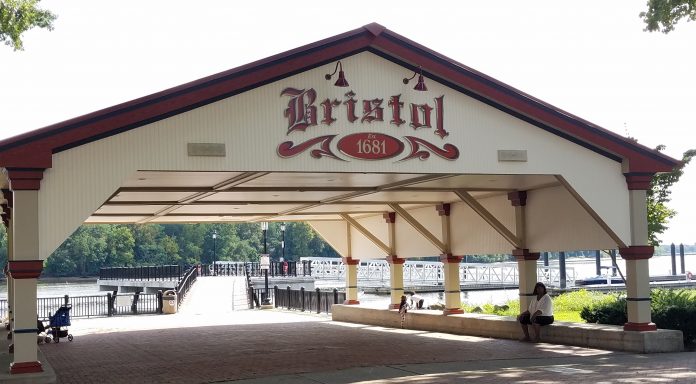When 2020 commenced, Bristol Borough’s ever-growing business district along Mill Street was positively thriving. New shops opened left and right, restaurants were packed to the brim, and visitors from across the county and beyond traveled to take photos with the massive Bucks County traveling logo, situated at the edge of the street.
But then, COVID-19 reared its ugly head, and owners were forced to either quickly adapt their services or close their doors. Though fear of the future is still very much present, Bill Pezza, president of Bristol Borough Raising the Bar, a volunteer organization working to promote and improve the town, is confident the community can come out of the pandemic stronger than ever.
“We were Bucks County’s best success story. After being in the dark for a long, long time, the media picked up on it. Tourists groups picked up on it. We were hot, we were the buzz. And we just cannot, and will not, allow ourselves to slip back to what we were before,” he said.
In order to provide local business owners with guidance on how to keep Mill Street thriving, rather than deserted and abandoned like in years’ past, Raising the Bar and Bucks County Community College’s Business & Innovation Department recently presented the free, virtual conference “Different is the New Normal: Adapting Your Business to a Changing World.” This was the first in a series of seminars aimed at helping owners modify their business and marketing strategies to meet the evolving needs of customers during and after the pandemic.
According to Pezza, success of the town is only possible if everyone works together, stays positive and, as the title suggests, thinks differently.
“Calm Waters has a great coffee shop. If the street dies, so will Calm Waters. The King George is a wonderful restaurant. It cannot exist in a vacuum. We need all of us – Itri, King George, Bristol Antiques Market, Canal’s End. Every business has to be working together to attract people to the street,” Pezza said. “We benefit from that.”
Tracy Timby, dean of the Business & Innovation Department, shared ways business owners can adapt and move forward. Since customers cannot physically step inside shops and restaurants at the moment, Timby stressed the importance of social media and websites.
“If you sell a product and you don’t have e-commerce options on your website, that’s something you really need to take some time and look at, and make it really easy for the customer to engage with your site, see what you have to offer. Even though people are at home and they seemingly have a lot of time on their hands, they still don’t want to be inconvenienced,” she said. “Look for a website platform that you can easily link with shipping, like ShipStation.”
For businesses without products or services to offer, Timby said selling gift cards through the website is a good option.
As for social media, Timby explained to the owners that creating an Instagram account and simply posting a picture of their food/products or their face could have a huge impact.
“Put your story out there and people will identify with you,” she said. “They love to look at other people, that’s how human beings connect. And once somebody connects with you, they’re more willing to give you their business. They’ll remember you because you have that connection.”
Pezza used Breanna Lynn Hitchens, owner of Re-URBAN It, as a prime example of social media’s importance. Hitchens, who opened her shop last year, was worried about how she’d survive during the pandemic. But she thought fast and came out on top.
“She said that last month was her best month since she opened. When this happened, she decided to double down on her social media presence. She doubled down on the releases she made to the public,” Pezza said. “So, it’s an encouraging sign.”
Marketing tactics for niche businesses were shared by Timby. For example, a clothing shop could host a Zoom session to discuss and show off the hottest fashion trends for summer. Participants will then be inclined to visit the shop’s website or stop by in person when it reopens.
Regarding antique shops, Timby suggested the owners feature items and provide interior decorating tips in a series of YouTube videos. If an individual is interested in a piece, they can then contact the store directly and set up a time for curbside pickup. Timby also mentioned FaceTime calls with clients, during which the owner can take a look at their home and make suggestions on various pieces.
“Once somebody agrees to do a one on one with you, it’s your customer to lose,” she said. “If somebody’s letting you see their house, they’re probably going to buy something from you.”
Topics to be discussed during upcoming seminars, the dates of which will be announced soon, are slated to include how to understand website analytics, how to safely take payments from customers using curbside pickup and the benefits of email marketing.
“Now is the time to really up your game on all of this. If, at the end of the month, everything’s back to normal and it was all like a terrible dream, all of your work that you’re doing to create a virtual presence is not going to go to waste,” said Timby. “Not only will you be keeping your existing customers, but you’re going to be building a whole new client base if you get out there virtually.”
In a few final words, Pezza reminded participants of Bristol’s tight-knit community.
“The residents of Bristol Borough want to help you. They want you to survive. They want our business district to be as vibrant as it was before this happened,” he said. “So, the more your reach out, the more you remind them that you’re there.”
Samantha Bambino can be reached at [email protected]


